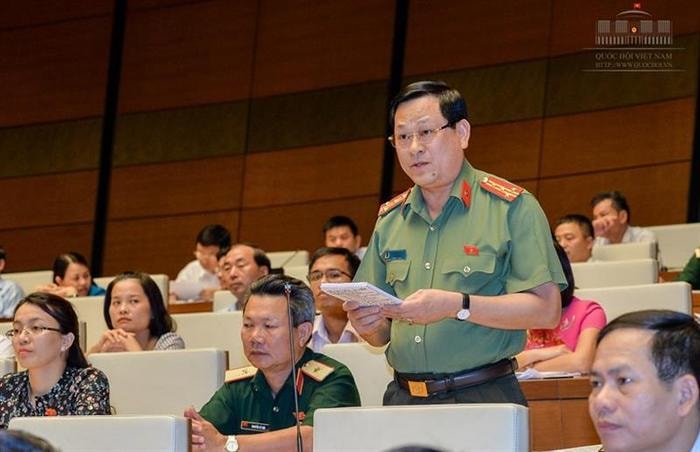Colonel Nguyen Huu Cau: What level is the intermediate level?
(Baonghean.vn) - This is the question raised by Colonel Nguyen Huu Cau - Director of Nghe An Provincial Police at the National Assembly forum when discussing the implementation of policies and laws on reforming the state administrative apparatus in the 2011-2016 period on the morning of October 30.
 |
| Colonel Nguyen Huu Cau speaks at the National Assembly. Photo: Quochoi.vn |
According to delegate Nguyen Huu Cau, although our state administrative apparatus is operating more and more effectively and efficiently, it contributes to the overall achievements of the country's innovation.
However, through studying reports from the Government and the National Assembly combined with recent practices, Colonel Nguyen Huu Cau assessed that there are 3 issues that are still vague and not clear, if not absent.
First of all, when assessing the weaknesses and shortcomings in the reform of the state administrative apparatus, there are two very important conclusions that are repeatedly mentioned in the monitoring report: the internal apparatus of ministries and ministerial-level agencies still has many layers and intermediate levels, and the situation of ministries within ministries is even more serious.
Based on this assessment, the draft Resolution of the National Assembly clearly states "reducing the intermediate level". "But the question is which level is the intermediate level?" - delegate Nguyen Huu Cau asked.
He cited that when investigating whether a general department is a ministry within a ministry or not, he found that out of 22 ministries and ministerial-level agencies, 17 ministries and ministerial-level agencies have general departments, while the remaining 5 ministries and ministerial-level agencies do not have general departments.
"Five ministries and ministerial-level agencies do not have a general department but still operate normally as in the past, such as the Ministry of Construction, the Ministry of Education and Training, the Ministry of Information and Communications, the Government Inspectorate, and the Ethnic Committee," delegate Nguyen Huu Cau pointed out.
"Voters hope that Ministers and Heads of localities will wisely put the interests of the country and the people before the interests of their sectors and localities. They are determined to reform the administrative apparatus to be streamlined and operate effectively and efficiently. Voters also request the Party, National Assembly and Government to continue to build and impose a legal framework, and prepare all resources for sectors and localities to implement it strictly, fairly and consistently."Colonel Nguyen Huu Cau |
The current number of general departments of the remaining 17 ministries and ministerial-level agencies is 40, under the general departments are departments, offices, divisions, and branches. In the apparatus of these ministries, there are both ministerial offices and general department offices, and the offices are clearly for service.
With the above analysis, Colonel Nguyen Huu Cau suggested that the National Assembly should clarify which intermediate level is in order to reduce it properly.
"In my opinion, it is time for the National Assembly to boldly clarify that the intermediate level in the central ministries and branches is the general department level and the division level in the departments and bureaus needs to be reduced" - the delegate from Nghe An delegation made a recommendation.
Delegate Nguyen Huu Cau also assessed that the issues of professional ethics, public service ethics, and public service discipline were mentioned in the report but were still vague.
In reality, the burning issue that voters and society are particularly concerned about is the situation of indifferent, insensitive, bureaucratic, arrogant officials, civil servants, and public employees, violations of the law, fake degrees, seeking positions and power, hasty appointments, the situation of superiors not listening to subordinates, and disregard for discipline and administrative order still occurring in many sectors and places.
“Public ethics and public discipline in state agencies and public service units still have many shortcomings. Professional ethics and public service ethics are still vague and have not been specifically regulated. Discipline and order applied to violators are still very slow and difficult,” said the Director of Nghe An Provincial Police.
Therefore, he suggested that the most important and effective measure is to have strong enough sanctions and strict handling measures. To do so, it is necessary to urgently research and propose a set of rules to regulate public service ethics standards that are specifically stipulated in legal documents.
Legalize standards of public service ethics and professional ethics. At the same time, state agencies need to take strong measures to remove from the state apparatus those who lack ethics and whose behavior lacks standards, negatively affecting the reputation of the agency and organization.
Another issue mentioned by delegate Nguyen Huu Cau is that the monitoring report lacks an assessment of the Party's policy on leadership positions that are not local people.
In Instruction No. 33 dated September 25, 2009 of the Central Organizing Committee on personnel work for the 11th National Party Congress, there are instructions for 9 positions that are not local people including: Secretary, Chairman, Head of the Public Security, Court, Procuracy, Inspectorate, Finance, Tax and Customs sectors.
In Conclusion No. 24 dated June 5, 2012, the Politburo promoted the planning and rotation of management staff until 2020 and the following years, leaving only 5 positions that are not local people, including: Secretary, Chairman of the People's Committee, Head of the Public Security, Court, and Procuracy. By 2015, it is expected that 25% of provinces and centrally run cities and 50% of districts will implement this policy.
However, through monitoring the situation, Colonel Nguyen Huu Cau found that the police sector implemented the policy resolutely and seriously, while other sectors found it difficult to implement. "I request the Government and the National Assembly to evaluate this policy," said Mr. Cau.
PV - CTV

